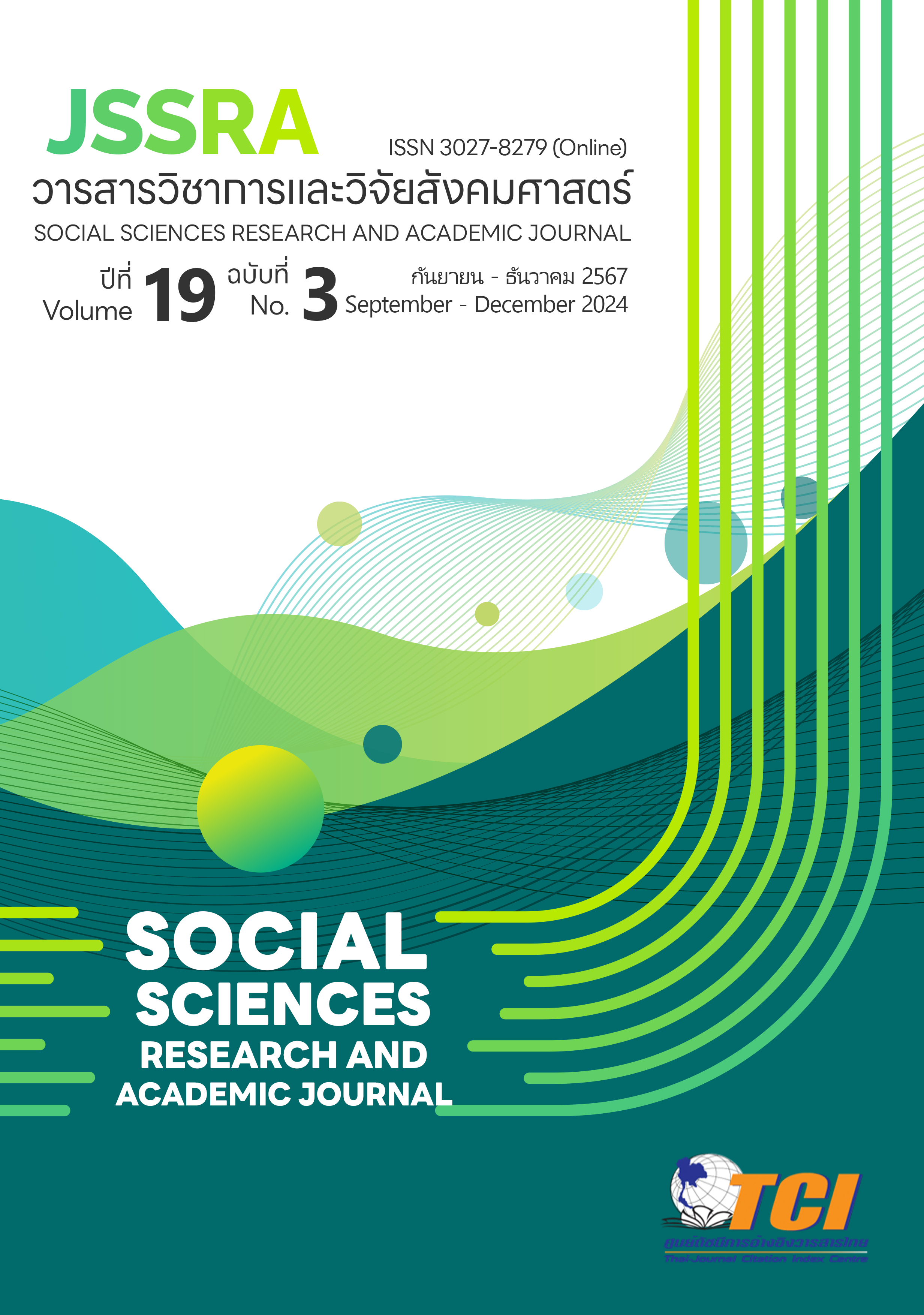Guideline for Applying of Principal of Works H.M. King Bhumibol Adulyadej the Great for Community Based Tourism (CBT) Development of Highland Community in Maephrik Sub - district at Mae Suai District in Chiang Rai Province
Main Article Content
Abstract
The purposes of the research were to 1) study the context of Ban Pangtonphueng highland community, Maephrik Sub - district, Mae Suai District, Chiang Rai Province in tourism components (5As), 2) assess the potential for community - based tourism management, 3) apply the principles of works of His Majesty King Bhumibol Adulyadej the Great for community - based tourism development of Ban Pangtonphueng highland community, Maephrik Sub - district, Mae Suai District, Chiang Rai Province. The study employed a mixed method research combining qualitative and quantitative research approaches. The data was collected from 150 participants using a questionnaire and 37 participants using working group and semi - structured interviews to collect in - depth data by purposive sampling. The data collected through assessments are analyzed using descriptive statistics while data from working group and interviews are analyzed using content analysis.
The research findings indicated that the Ban Pangtonphueng community is characterized by a natural landscape of highland area dominated by Assam tea forests. These forests remained verdant year - round. Every household primarily engages in Assam tea farming as their main occupation and maintains a traditional way of life, 67 housing 224 people. The village encompasses with tourism components 5As. Especially, attraction is the richness of the forest and a traditional tea - making practices with community - based tourism activities such as homestays. However, the community faces limitations in terms of inadequate facilities for accommodating tourists and a lack of knowledge and a tourism development plan. Nevertheless, the overall potential for community - based tourism management is assessed as high ( x= 3.67, S.D.= 0.684). The community can apply The Principal of Works H.M. King Bhumibol Aduladej, particularly the concept of "Explosion from within," to drive community - based tourism development through community participation, leading to sustainable community development.
Article Details
References
Assawasowan, J. et al. (2020). Local Ecological Knowledge of Pra Forest (Elateriospermum Tapas) in Nobphitum District, Nakhon Si Thammarat Province. Narkbhutparitat Journal Nakhon Si Thammarat Rajabhat University, 12(2), 53 - 70. (In Thai).
Boontun, O., & Pothitan, R. (2024). Developing a Self –Management Model for Successful Sustainable Community Forest Management. Journal of Social Science and Cultural, 8(6), 22–34. (In Thai).
Choibamroong, T. (2009). Roles of Local Government Organizations for Sufficiency Economy – Based Sustainable Tourism Development. Bangkok: Cabinet and Royal Gazette Publishing Office. (In Thai).
Fongissara, N. (2016). Social Network Model of Cultural Tourism in Akha Ethnic Group Homestays in Songkhwaepattana Village, Maeyao Municipality, Chiangrai. Journal of Social Sciences and Humanities, 7(2), 15 - 41.
Harimtepathip, Nopchalermroj, & Suntornwanawes Shaw (2023). Geosocial: An Analytic, Appreciative, and Applicative Study. Journal of Dhammasuksa Research. 6(2), 64 - 72. (In Thai).
Jittangwattana, B. (2005). Tourism Industry. Bangkok: Press & Design. (In Thai).
Kalapukdee, P. (2021). Guideline for Sustainable Management of Community Forest Resources in Easterm Region. Law and Local Society Journal, 5(1), 1 - 27. (In Thai).
Office of The Royal Development Projects Board (ORDPB). (n.d.). Principal of Works H.M. King Bhumibol Adulyadej The Great. Retrieved. April 10, 2024, from https://www.rdpb.go.th/th/King/หลักการทรงงาน-c24. (In Thai).
Pimapunsri, P. & Wisansing, J. (2022). Community benefitting through tourism (CBTT Dasta model) an integrated approach. RMUTT Global Business and Economics Review, 17(1), 46 - 60. (In Thai).
Putjorn, T. (2011). Local Wisdom in Natural Resource Management of Mae - Kampong Community, Mae - On District, Chiang Mai Province. Research Conference. Khon kaen University. 207 - 211. (In Thai).
Raepet, J. & Boonsayan, R. (2021). Public and Community Cooperation Management of Mae Kampong Village, Mae On District, Chiang Mai Province. Journal of Roi Kaensarn Academi, 6(7), 1 - 13. (In Thai).
Sangchumnong, A. (2018). Challenges of Cultural Heritage Communities to Sustainable Tourism Destination Development. Journal of Cultural Approach, 19(36), 82 - 91. (In Thai).
Silapat, J. (2008). The Project of Planting Forests in the People’s Hearts. Journal of Forest Management, 2(4), 69 - 73. (In Thai).
Sriwattana, S., et al. (2017). Integrated Research of Miang (Camellia Sinensis Var. Assamica) for Local Wisdom Inheritance and Economic Value. (Research Report). Retrived March, 23, 2024, from https://hectortarr.arda.or.th/api/uploaded_file/5IIwBCOXRnSNqE08DIDaq. (In Thai).
Suansri, P. & Yeejorhor, S. (2013). CBT Standard Handbook. Chiangmai: Wanida Printing. (In Thai).
Suansri, P. (2003). Community Based Tourism Handbook. Bangkok: Responsible Ecological Social Tour - REST. (In Thai).
Sutum, P. (2019). Learning Potential Empowerment of Local Communities in Management of Natural Resources in Head Watershed Forest of Nam Rad Forest - Ma Loh Canal, Suratthani Province. Suratthani Rajabhat Journal, 6(2), 139 - 172. (In Thai).
Thongma, W. & Trakansiriwanich, K. (2011). Sustainable Cultural Tourism Management Through Sufficiency Economy Philosophy of Mae - Ngon Watershed Area, Fang District, Chiangmai Province, Thailand. (Research Report). National Research Council of Thailand (NRCT). (In Thai).
Tungseng, T. (2021). Guidelines for Community Based Tourism Development in the Three Southern Border Provinces Based on Thailand’s Criteria for Community Based Tourism. Journal of Community Development and Life Quality, 9(2), 26 - 44. (In Thai).
Uthienwichianpanya, A. & Anantatanachai, P. (2018). Participation in Community Cultural Development Tourism at Nakhonpanom Province. Journal of Multidisciplinary in Humanities and Social Sciences, 1(2), 25 - 35. (In Thai).
Wongrod, V. (2016). The Development Approach for Cultural Tourism Management: A Case Study on Thai Zong Dam Community in Ban Nong Nuen, Nakhon Sawan Province. Journal of Social Academic, 9(2), 26 - 44. (In Thai).


